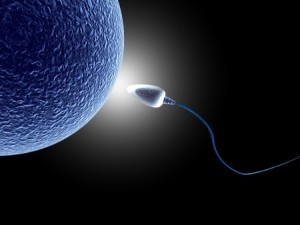
Category Archives: IVF
IVF Pregnancy Success Patient Testimonial – Pregnant at 42
IVF Hope Finds A Way!
My IVF journey began when I was 39. I had five IVF failures (5) at three different fertility clinics in NYC before I came to New Hope Fertility Center. At my former clinics I was given high doses of drugs and produced many egg follicles. However, shortly after fertilization most of the embryos would arrest and the ones transferred to my uterus would not implant. I was diagnosed as hopelessly infertile.
At 41 – discouraged and feeling hopeless – I came across New Hope and was intrigued by their mission of treating difficult patients. I met with Dr. Zhang and immediately felt comfortable and hopeful again. Dr. Zhang reviewed my records of previous IVF attempts and designed a different protocol for me. Unlike other clinics, New Hope has a customized regimen for each patient. They do not use a cookie-cutter approach.
Dr. Zhang and my fertility care team found the IVF regimen that worked best for me. I was given less drugs and then my embryos were frozen. At age 42, I had a successful frozen embryo transfer during my natural cycle. My husband and I now have a beautiful baby boy.
Customized IVF Treatment Plans
It is important to work with a fertility doctor having the research and clinical experience required to design a customized IVF treatment plan meeting your personal and medical needs. Click the icon below – or – call 212.969.7422 to schedule your initial consultation.
Discover a Streamlined Approach to IVF Treatment
 A streamlined fertility team approach provides evidence-based higher IVF pregnancy success rates. It is not necessary for you to consult with your fertility doctor at every blood draw and ultrasound monitoring visit. A streamlined approach is cost-efficient IVF. Our team works in tandem with your fertility doctor at every stage of treatment.
A streamlined fertility team approach provides evidence-based higher IVF pregnancy success rates. It is not necessary for you to consult with your fertility doctor at every blood draw and ultrasound monitoring visit. A streamlined approach is cost-efficient IVF. Our team works in tandem with your fertility doctor at every stage of treatment.
Streamlined Fertility Team Approach
A streamlined fertility team approach to IVF treatment is the most successful at increasing pregnancy success rates.
The multidisciplinary team at New Hope Fertility Center is comprised of world renowned fertility doctors, plus ultra-talented:
- Medical Assistants
- Ultrasound Technicians
- Embryologists
Our multidisciplinary team has substantial experience in the practice of Assisted Reproductive Technology (ART) and OBGYN.
Our Multidisciplinary Fertility Team
Members of the fertility team at New Hope Fertility Center are professionals who have earned:
- Doctorates
- PhD’s
- Master’s Degrees
Through a streamline approach, your primary doctor is always fully informed about your progress by the multidisciplinary fertility team.
- Always remember. Just because you don’t see your doctor every time you visit our office for a routine procedure does not mean you are receiving subpar care.
- Please know this. Our multidisciplinary fertility team has been carefully selected and put in place to make sure you receive the best fertility care in the world.
- The best part? Our patients do not rely on doctors in residency to fulfil their dreams of having a baby.
At New Hope Fertility Center, all patient cases are evaluated, reviewed and discussed by and between their multidisciplinary fertility team. The team collectively arrives at and executes the best customized fertility treatment plan based upon every patient’s individualized needs.
A Streamlined Fertility Team Approach
To increase your chances of pregnancy, place your trust in a multidisciplinary fertility team approach. Contact the Fertility Experts at New Hope Fertility Center if you’re struggling with infertility. It is important to work with a fertility care team having a thorough understanding of the root cause of your infertility.
A multidisciplinary team approach to treating your infertility will:
- Offer the highest chances of pregnancy
- Are the most cost-effective
- Produce the best overall patient trust and satisfaction
Streamlined Fertility Team Approach
It is important to work with a fertility doctor having the expertise required to design a customized IVF treatment protocol meeting your personal needs. To schedule your initial consultation with Dr. John Zhang at New Hope Fertility Center – call 212.969.7422.
How Embryology is Key to IVF Pregnancy Success

 Expertise in embryology is key to IVF pregnancy success. Embryology is the study of an embryo from the first stage of fertilization through fetal development. High quality embryos have the highest chance of implantation into a woman’s uterine lining resulting in a successful pregnancy. After egg retrieval, one or two healthy embryos are transferred after a fresh IVF cycle. Excess embryos culturing in vitro are cryopreserved for future pregnancies through Frozen Embryo Transfers (FET).
Expertise in embryology is key to IVF pregnancy success. Embryology is the study of an embryo from the first stage of fertilization through fetal development. High quality embryos have the highest chance of implantation into a woman’s uterine lining resulting in a successful pregnancy. After egg retrieval, one or two healthy embryos are transferred after a fresh IVF cycle. Excess embryos culturing in vitro are cryopreserved for future pregnancies through Frozen Embryo Transfers (FET).
Embryology Roles in the IVF Process
- HRSS – High Resolution Sperm Selection
- ICSI – Intracytoplasmic Sperm Injection
- Assisted Hatching
- In Vitro Maturation
- EmbryoScope
Embryologists at New Hope Fertility Center choose the healthiest sperm to fertilize an egg in vitro. Cutting edge technology provides embryos culturing in vitro with an optimum environment for healthy development prior to fresh transfer and/or cryopreservation.Read more: How Embryology is Key to IVF Pregnancy Success
How ICSI Enhances IVF Treatment
 Male reproductive issues are just as likely to cause a couple’s infertility as female issues. Male fertility issues include low sperm count, the absence of sperm, issues with sperm movement, and abnormal sperm shape. Intracytoplasmic Sperm Injection (ICSI) is a cutting edge medical technique used in conjunction with IVF to increase the chances of a sperm fertilizing an egg. ICSI is a form of micromanipulation that involves the injection of a single sperm directly into the cytoplasm of a mature egg (oocyte) using a glass needle (pipette). If there is any problem with a sperm’s ability to fertilize the egg (either due to low sperm count or poor sperm quality) ICSI is the most common and accurate method for solving it. Our colleagues were part of the original Belgian team that developed ICSI, and who first introduced it in the U.S. Eggs are retrieved in the same way as if you were doing conventional IVF, however, the eggs and the sperm are then fertilized in the laboratory, by direct injection of a single sperm into each egg. Two to five days later the resulting embryos are placed into the uterus (without surgery), just as with IVF procedures and any other embryos can be frozen for later using our method of vitrification.
Male reproductive issues are just as likely to cause a couple’s infertility as female issues. Male fertility issues include low sperm count, the absence of sperm, issues with sperm movement, and abnormal sperm shape. Intracytoplasmic Sperm Injection (ICSI) is a cutting edge medical technique used in conjunction with IVF to increase the chances of a sperm fertilizing an egg. ICSI is a form of micromanipulation that involves the injection of a single sperm directly into the cytoplasm of a mature egg (oocyte) using a glass needle (pipette). If there is any problem with a sperm’s ability to fertilize the egg (either due to low sperm count or poor sperm quality) ICSI is the most common and accurate method for solving it. Our colleagues were part of the original Belgian team that developed ICSI, and who first introduced it in the U.S. Eggs are retrieved in the same way as if you were doing conventional IVF, however, the eggs and the sperm are then fertilized in the laboratory, by direct injection of a single sperm into each egg. Two to five days later the resulting embryos are placed into the uterus (without surgery), just as with IVF procedures and any other embryos can be frozen for later using our method of vitrification.
ICSI Enhances IVF Treatment
In order to fertilize an egg, sperm must be able to penetrate the egg. This is a problem if there are a low number of sperm, if sperm are abnormally shaped, or if the sperm is not motile enough to reach and penetrate into the egg.
ICSI addresses all of these issues.
- An egg is surgically retrieved via IVF
- A single sperm is placed in a small syringe attached to a tiny needle
- A single egg is held and the single sperm is injected into the middle of the egg
- The egg is then monitored for signs of fertilization
Healthy Lifestyle Choices While Undergoing IVF Treatment
 Many of my IVF patients procrastinate on making healthy lifestyle changes before treatment. If you are contemplating IVF treatment, you must begin healthy lifestyle habits at least six months before you begin the process to prepare your body for pregnancy. Don’t wait until you are pregnant to get serious about a healthy lifestyle. Good lifestyle choices will greatly boost your fertility and help you have a healthy baby.
Many of my IVF patients procrastinate on making healthy lifestyle changes before treatment. If you are contemplating IVF treatment, you must begin healthy lifestyle habits at least six months before you begin the process to prepare your body for pregnancy. Don’t wait until you are pregnant to get serious about a healthy lifestyle. Good lifestyle choices will greatly boost your fertility and help you have a healthy baby.
Preparing for IVF Treatment
A successful IVF is greatly supplemented by a patient’s reliable fertility diet and healthy body mass index. I always offer my patients helpful resources by recommending they avoid detrimental lifestyle choices.
This is true regardless of your chosen IVF protocol.
Begin an Acupuncture Regimen
Without a doubt, beginning acupuncture treatment three months before your IVF transfer will enhance your chances of a successful pregnancy. Studies have shown that women who underwent acupuncture before, during and after IVF embryo transfer increased their chances of pregnancy by up to 42 percent. Why is this important? The pregnancy success rate of those who did not undergo acupuncture was only 26 percent.
In-House Acupuncture Therapy and IVF
These phenomenal IVF success rates are why New Hope Fertility NYC unveiled its in-house acupuncture therapy treatment program in July of 2017! Our acupuncturists are specially trained in acupuncture therapy with a focus on treating women’s infertility. The World Health Organization (WHO) and the National Institutes for Health have found that acupuncture is a viable and accepted method of treating female infertility.
- Enhances IVF success rates
- Reduces stress during IVF treatment
- Enhance ovarian function
- Increase blood supply to reproductive organs – especially the uterus
The IVF Embryo Transfer Acupuncture Plan
Acupuncture can begin at any time during your fertility treatment – but this is the best plan of action:
- Plan an acupuncture treatment on the morning of your transfer
- Plan another in the afternoon following your transfer
- Book an acupuncture session five days after your transfer
- Book a follow up acupuncture session 5 to 7 days later
Read more: Healthy Lifestyle Choices While Undergoing IVF Treatment
Increase Your IVF Vocabulary: Infertility Treatment Terms
 During infertility treatment, you will commonly be confronted with unfamiliar acronyms and terms describing your diagnosis and treatment plan. These acronyms and terms may be confusing and can make understanding your diagnosis and treatment challenging. Dr. John Zhang has compiled a list of acronyms and definitions of terms you should familiarize yourself with as you begin your infertility treatment.
During infertility treatment, you will commonly be confronted with unfamiliar acronyms and terms describing your diagnosis and treatment plan. These acronyms and terms may be confusing and can make understanding your diagnosis and treatment challenging. Dr. John Zhang has compiled a list of acronyms and definitions of terms you should familiarize yourself with as you begin your infertility treatment.
Infertility Treatment Terms You Should Know
AMH
Anti-Mullerian Hormone (AMH) is one of the primary indicators of a woman’s egg reserve. The AMH hormone produces egg follicles in a woman’s ovaries. The lower a woman’s level of AMH, the lower the number of eggs she has remaining. A woman’s ovarian reserve is one of the primary measurements of her fertility.
FSH
Follicle Stimulating Hormone (FSH) is one of the primary hormones evaluated as a part of the fertility diagnostic process. FSH is responsible for stimulating ovarian follicles to mature during a woman’s cycle. FSH levels that are outside of normal levels are generally evidence of a low ovarian supply.Read more: Increase Your IVF Vocabulary: Infertility Treatment Terms
Why Opt For ICSI In Conjunction With IVF?
 Intracytoplasmic Sperm Injection (ICSI) is an innovative method of fertilizing eggs in conjunction with In Vitro Fertilization (IVF). By using ICSI in conjunction with IVF, we can greatly increase the chances of achieving a healthy embryo and a successful pregnancy.
Intracytoplasmic Sperm Injection (ICSI) is an innovative method of fertilizing eggs in conjunction with In Vitro Fertilization (IVF). By using ICSI in conjunction with IVF, we can greatly increase the chances of achieving a healthy embryo and a successful pregnancy.
How ICSI in Conjunction with IVF Works
ICSI is an in vitro (laboratory) procedure that involves injecting a single sperm directly into an egg for fertilization. This is a great option for men who would otherwise be considered infertile due to low sperm count, low motility, or other fertility complications.
The sperm can be removed directly from the man’s fresh ejaculate that has been washed and prepared in the laboratory. Once a single sperm has been immobilized, it is retrieved into a micropipette and then injected directly into an egg.
ICSI boasts a very high success rate and has no harmful effect on the resulting embryos. In fact, over 100,000 babies have been born this way.
ICSI is not just for men who are infertile. At New Hope Fertility Center, ICSI is used as a standard ancillary procedure to IVF because it results in higher fertilization rates of the eggs. Higher quality egg fertilization rates results in more high quality embryos.
Sperm Extraction Techniques
For men that do not have enough sperm in their ejaculate, we can still extract the sperm needed to fertilize the eggs through other methods:
- Microsurgery – In many cases, we can retrieve sperm directly from the man’s testicles through a microsurgical process. This surgery is done under local anesthesia and takes just a few minutes. Most men report little to no pain during recovery.
- Fine needle aspiration – This option also extracts sperm from the testicles and is a good fit for men who do not wish to or are unable to undergo surgery. Instead, a thin needle is inserted into the testicle to extract the sperm.
Using testicular sperm for IVF has virtually the same success rates for fertilization as using ejaculated sperm. The only drawback is that testicular sperm does not freeze as well for future use. It is more practical to fertilize eggs with the testicular extracted sperm and freeze the resulting embryos.
Learn More about ICSI in Conjunction with IVF
Dr. Zhang is a highly trained fertility specialist and can answer any questions you may have about the process of ICSI in conjunction with IVF. Here at the New Hope Fertility Center, we offer ICSI to all of our IVF patients at no extra charge. Dr. Zhang will work with you and your partner to design a customized IVF protocol that is most appropriate to your medical history and personal preferences. Call us at 917.525.5496 to schedule your first consultation. We look forward to helping you conceive.
2017’s Candidates for Conventional IVF
The most common treatment for infertility is Conventional IVF (in vitro fertilization). Thanks to innovative IVF ancillary technologies – such as ICSI and PGD/PGS/NGS – Conventional IVF is very successful for the right candidate.
 Candidates for Conventional IVF
Candidates for Conventional IVF
Typical candidates for Conventional IVF:
- Women under 35 who can produce multiple quality eggs
- Women having blocked or damaged Fallopian tubes
- Women who are facing cancer treatment and have little time to cryopreserve their eggs before chemo or radiation treatment
- Couples diagnosed with male factor infertility
Conventional IVF is recommended for women who have failed to achieve a pregnancy after undergoing a series of IUI.
Varied IVF protocols available today:
· Mini-IVF™Read more: 2017’s Candidates for Conventional IVF
How to Plan Ahead for Travel During IVF Treatment
 Fertility medication is an integral and vital part of In Vitro Fertilization (IVF) treatment. Medication is used to delay the start of a cycle, spur the growth of eggs, and trigger ovulation. In order for an IVF treatment cycle to have the best chance at pregnancy success, it is important that all prescribed fertility medication be taken at the time and dose indicated by your fertility care tam. Failing to do so can result in the IVF cycle being unsuccessful.
Fertility medication is an integral and vital part of In Vitro Fertilization (IVF) treatment. Medication is used to delay the start of a cycle, spur the growth of eggs, and trigger ovulation. In order for an IVF treatment cycle to have the best chance at pregnancy success, it is important that all prescribed fertility medication be taken at the time and dose indicated by your fertility care tam. Failing to do so can result in the IVF cycle being unsuccessful.
Administering IVF Medications While Traveling
Finding the time and place to administer fertility medication can take some maneuvering and coordination.
This is true regardless of your chosen IVF protocol – traditional or holistic.
· Mini IVF
· Natural IVFRead more: How to Plan Ahead for Travel During IVF Treatment
How ICSI Enhances IVF Pregnancy Success
Intracytoplasmic Sperm Injection (ICSI) is a method of addressing male-factor infertility during In Vitro Fertilization (IVF) treatment. Rather than allowing fertilization to happen by combining eggs and sperm in a lab dish, ICSI entails the injection of a single sperm directly into an egg in order to facilitate fertilization. Knowing more about the ICSI process, and its effectiveness, can help you decide if this ancillary treatment in conjunction with IVF is an option for you.
ICSI in Conjunction with IVF
In order to be considered fertile, a man’s sperm must:
- Be present in sufficient quantities
- Be shaped normally
- Swim in the correct direction
- Swim at the right speed
Should any of these functions be diagnosed as abnormal, a man may not be able to impregnate a woman because his sperm cannot penetrate her egg. A man may be infertile even if he produces adequate quantities of sperm in ejaculate. Should his sperm be misshaped or not move correctly, fertilization will be difficult, if not impossible.Read more: How ICSI Enhances IVF Pregnancy Success

